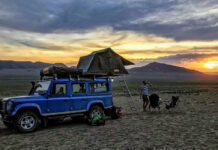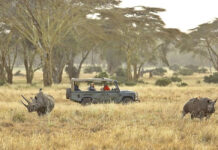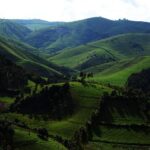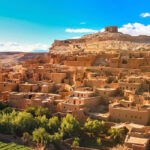The sequence of posts around Christmas narrating the traditional lifestyle of James’s village attracted favourable comment so here is the story of our return there in the last week of March.
James had already returned a couple of times on his own in January and February to support his mother, who was, unsurprisingly, suffering from exhaustion, and to take a dossier of technical advice to Simon to help deal with the multitude of afflictions: fungal, insect-related and mineral deficiency, that you will recall were beginning to have a damaging effect on his orchard.
Next, in mid-March, came news that the communal borehole which had served the community’s water needs for twenty years was broken and there was neither leadership, organisation nor funding to fix it. James’s cousins, Wilson and Sanyo, were taking it in turns to cycle to another borehole about half an hour away, fill up three 20litre plastic Gerry cans and then undertake the laborious task of pushing the bicycle home again. Clearly that situation could not be allowed to continue indefinitely.
James returned, initially to help with planting peanuts but then prioritised digging a well in the family compound next to the kitchen himself. In the space of five days he was able to excavate five feet of soil from a shaft four feet across.
Protracted delays by the Department of Immigration in Nairobi in issuing my Special Pass trapped me in Kenya. Eventually on March 24 I received the Special Pass, eight weeks after applying for it, a procedure which should have taken two.
Proudly clutching the cherished scrap of paper that proclaimed itself to be a Special Pass, I travelled to the border the following day, crossed the Malaba stream, and took a boda for the twenty minute journey to the hotel in Tororo where James was waiting to welcome me and take me back to the village on the once daily bus.
Next morning, I was able to inspect progress on his excavations. It was obvious that the shaft had hit rocks, with as yet no sign of water,only a damp patch at the bottom. By this time, a couple of neighbours had turned up to volunteer to take it in turns to carry out this back breaking work.
By means of this ladder, the guys swapped over at roughly hourly intervals. The off duty crew winched up the bucket filled with smashed rock, which happily by now was,showing clear signs of moisture.
In order to break through the layer of rock, the only way forward was to sit on the bottom of the well and hack away with a pick-axe
After a couple of days of this, water started seeping up steadily from below so next the lowest third of the well was sealed with a ring of bricks that were then covered with waterproof cement. The final step was covering the bottom with fine river sand which acts as a filter to purify the water.
At the time of writing the twenty three foot deep well has eighteen feet of water. The rains arrived within a couple of days of the well being finished so the water table has risen dramatically since then. But because the well was dug right down to the water table level at the very end of the dry season, the Opoya family is assured of year round fresh water for at least the next twenty years. James has ample reason to take pride in this considerable achievement.
On the eve of the rains it was all hands to the pump to prepare the land for planting.
The following morning, two women from the village joined Sanyo to plant the ground nuts. Each nut is planted in its individual slit in the soil requiring the dexterity of women’s hands.
Sanyo gets stuck in to planting
It soon became apparent that there weren’t enough ground nuts to plant the half acre plot. The rest of the family, supplemented by neighbours sat down to shell another sack.
Philemon suffered from polio as a child but has not let it dampen his natural optimistic outlook on life
Only four members of the family were exempted from planting duties:
After all the nuts were planted, the planting team settled down to a well-earned cup of tea.
Nearby the neighbours’ children gathered together and posed for a photograph
The job was well-timed. That very night the first heavy shower of the year fell, so the newly-planted seeds were well watered.
The arrival of the rains has caused the colony of bees which has a hive in one of the trees in the compound to swarm
During my visit, I learned that the family had recently received an out of the blue visit from Sanyo’s grandmother. When Sanyo and Wilson’s parents died six years ago, custody of the children fell to the grandmother. After a few weeks she turned up with them at James’s family, dumped the children with James’s mother, and disappeared….. Six years later, now that Sanyo at 14 is at “marriageable” age, although the legal age in Uganda is 18, she reappeared, unannounced, a few weeks ago to reclaim her grand daughter. James’s mother flatly refused to relinquish care of Sanyo, parrying the old harridan’s demands with a suggestion Sanyo could perhaps go to live with her grandmother after sitting her exams in November. Appreciating the serious danger Sanyo was in, I asked her for a private chat. I opened by asking her what she wanted to do with her life. ” Be a doctor” she replied confidently. ” Well, if you leave here, other people will take decisions to control your life and you never will be” I warned. “This is your home, and here you will be given support to continue your education.” Subsequent reports indicate this advice has had an effect. I sincerely hope so.
The thought of Sanyo being auctioned off to an old (disease-ridden?) latter-day Henry VIII, in exchange for a few goats and cows, is too disgusting to contemplate. Women’s and minors’ rights in parts of rural Uganda are non-existent.
The arrival of the rains at Nyemera brought an influx of birds, whose calls reverberated around the compound. The most exciting were three special cuckoos: Red-chested, Klaas’s and Levaillant’s. Here they are:
The time had come for me to travel to Nairobi and James to Kampala on separate missions. We planned to meet back at Nyemera four days later. But just after we left the rains arrived for real. The deluge was biblical, literally hours of torrential rain, making roads impassable and bringing normal life to a halt. It was completely impractical for me to go back. So sadly the anticipated birding trips around the village have been postponed indefinitely.
On a positive note, the crops were planted in the nick of time and since then there has been sunshine in between the rains, which make for excellent growing conditions, presaging a good harvest in August.













